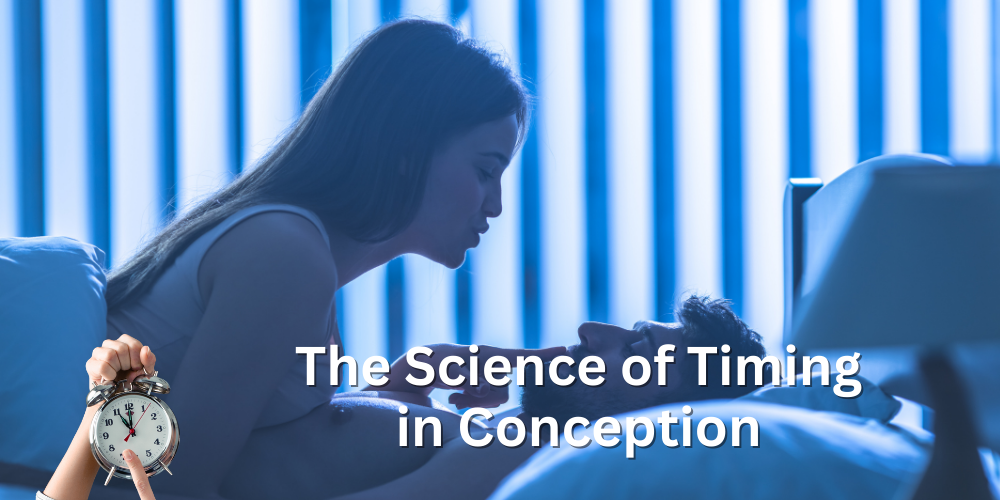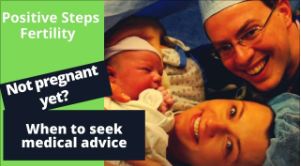By Dr. Preston Parry
Understanding the science of timed intercourse, in the journey toward parenthood, can be both empowering and transformative. As a fertility specialist with years of experience guiding couples through the complexities of conception, I’ve seen firsthand the profound impact that knowledge and timing can have on achieving a successful pregnancy. Today, I’m delving into the science of timed intercourse, a critical component in optimizing your chances of conceiving.
Understanding the Fertility Window and Timed Intercourse
The cornerstone of timed intercourse is the “fertility window”—a brief period each month when pregnancy is possible. This window spans six days, including the day of ovulation and the five days preceding it. Why these days? Sperm can survive in the female reproductive tract for up to five days, and an egg remains viable for about 24 hours after ovulation. Timing intercourse within this window is paramount.
The American Pregnancy Association explains that the optimal timing (the fertile window) for pregnancy involves a three-day window, based on the woman’s ovulation date and the knowledge that sperm can survive within her body for 3-5 days. Therefore, it is recommended to have intercourse once a day on the following days:
- Two days before ovulation
- One day before ovulation
- On the day of ovulation
Engaging in intercourse more than once daily doesn’t enhance the chances of conception and may, in fact, diminish the male’s sperm count.
Hence, for couples attempting to conceive naturally, engaging in sexual intercourse approximately 72 hours before and during ovulation should optimize their chances of conception, without the necessity for LH predictor kits, basal body temperature charting, and so forth.
Some couples may also use ovulation induction, which is the use of medication to stimulate the ovaries to produce more eggs or to trigger ovulation. This can increase the number of eggs available for fertilization and improve the timing of ovulation.
Another option is to use intrauterine insemination (IUI), which is an assisted reproductive technique that involves placing sperm directly into the uterus after ovulation induction. This can bypass some potential barriers in the reproductive tract and increase the chances of sperm reaching the egg.
The Science Behind Ovulation and Timing
Ovulation is the release of an egg from the ovary, a moment poised for fertilization. It typically occurs midway through the menstrual cycle, around day 14 in a 28-day cycle. However, cycles vary widely among individuals, making it essential to identify your unique pattern.
Detecting Ovulation
Several methods can help pinpoint ovulation:
- Ovulation Predictor Kits (OPKs): These over-the-counter tests detect the surge in luteinizing hormone (LH) that precedes ovulation by 24-36 hours, offering a practical signal for optimal timing.
- Basal Body Temperature (BBT) Tracking: A slight rise in body temperature follows ovulation. Charting your BBT daily can help identify this phase over time, though it’s more of a retrospective tool.
- Cervical Mucus Changes: Around ovulation, cervical mucus becomes clear, stretchy, and more abundant, resembling egg whites. This change indicates a fertile state.
Ovulation Cycles and Timed Intercourse Tests
timed intercourse test is a simple and non-invasive way to evaluate a couple’s fertility potential. It involves having sexual intercourse at specific times during the woman’s ovulation cycle and then collecting a semen sample from the man after the last intercourse. The semen sample is then analyzed in a laboratory to check the number and quality of sperm that are present in the cervical mucus.
The timed intercourse test can help determine if there are any problems with sperm transport, sperm survival, or sperm-cervical mucus interaction. It can also help assess the effectiveness of fertility treatments such as ovulation induction or IUI. The timed intercourse test is usually done in conjunction with other fertility tests, such as hormone levels, ultrasound scans, and tubal patency tests.
What are the benefits of timed intercourse?
Timed intercourse can be a good option for couples who have no major fertility issues and who want to try a natural or low-intervention treatment before moving on to more complex techniques such as in vitro fertilization (IVF).
Timed intercourse may be recommended for:
- Women whose fallopian tubes have no obstructions
- Women whose uterus is normal
- Women whose partner doesn’t have unexplained male factor infertility
However, timed intercourse may not be effective for couples who have:
- Severe endometriosis
- Blocked or damaged fallopian tubes
- Severe male factor infertility
- Advanced maternal age
Beyond Timing: Enhancing Fertility
While timing is crucial, other factors also influence fertility, such as:
- Lifestyle Adjustments: Maintaining a healthy weight, reducing stress, quitting smoking, and limiting alcohol intake can enhance fertility for both partners.
- Nutritional Support: A balanced diet of antioxidants, vitamins, and minerals supports reproductive health. Consider supplements like folic acid for their added benefits.
- Medical Consultation: For those with underlying health conditions or who have been trying to conceive for over a year (or six months if over 35), consulting a fertility specialist can identify and address potential hurdles.
Alternatives to Timed Intercourse
Timed intercourse is not always effective or feasible for everyone. Some couples may find it stressful, inconvenient, or emotionally draining. Fortunately, there are other fertility treatment alternatives to timed intercourse that you can explore with your doctor. Here are some of them:
- Ovulation induction: This is when you take medication to stimulate your ovaries to produce one or more eggs. This can help if you have irregular or absent ovulation, or if you want to increase the number of eggs available for fertilization.
- Intrauterine insemination (IUI): This is when sperm is washed and concentrated and then placed directly into your uterus around the time of ovulation. This can help if you have low sperm count or motility, cervical mucus issues, or unexplained infertility.
- In vitro fertilization (IVF): This is when eggs are retrieved from your ovaries and fertilized with sperm in a laboratory. The resulting embryos are then transferred to your uterus or frozen for future use. This can help if you have blocked or damaged fallopian tubes, severe male factor infertility, genetic disorders, or failed other treatments.
- Donor eggs or sperm: This is when you use eggs or sperm from a donor to conceive. This can help if you have poor egg or sperm quality, age-related infertility, or genetic diseases that you do not want to pass on to your child.
- Surrogacy: This is when another woman carries and delivers your baby for you. This can help if you have uterine abnormalities, medical conditions that prevent you from carrying a pregnancy, or repeated miscarriages.
Common Misconceptions of Timed Intercourse
Misconception 1: More Frequent Intercourse Guarantees Success
Quality over quantity holds true in timed intercourse. Excessive frequency can reduce sperm quality and quantity. Every other day within the fertile window strikes a balance between optimizing sperm availability and ensuring the best possible conditions for conception.
Misconception 2: Ovulation Always Occurs on Day 14
The idea that ovulation occurs precisely on day 14 is a simplification. Individual cycles vary, and factors like stress, illness, and lifestyle can influence timing. Personalizing your approach by tracking and understanding your cycle is key.
Misconception 3: Age Does Not Affect Fertility
Age is a significant factor in fertility for both men and women. While modern medical interventions have extended the window of opportunity, understanding the impact of age on fertility can aid in planning and decision-making.
Embracing the Fertility Journey
The path to conception is unique for every individual and couple. While the science of timed intercourse provides a roadmap, patience, understanding, and compassion are equally important. Celebrate the small victories, support each other through the challenges, and remember, the journey to parenthood is a shared adventure.
In conclusion, the science of timed intercourse is a powerful tool in the journey toward conception. By combining an understanding of your fertility window with lifestyle adjustments and, when necessary, medical guidance, you’re taking informed steps toward expanding your family. Want to learn more about other fertility treatments? Reach out to a fertility specialist today. Don’t suffer in silence. Find answers. Find peace.




